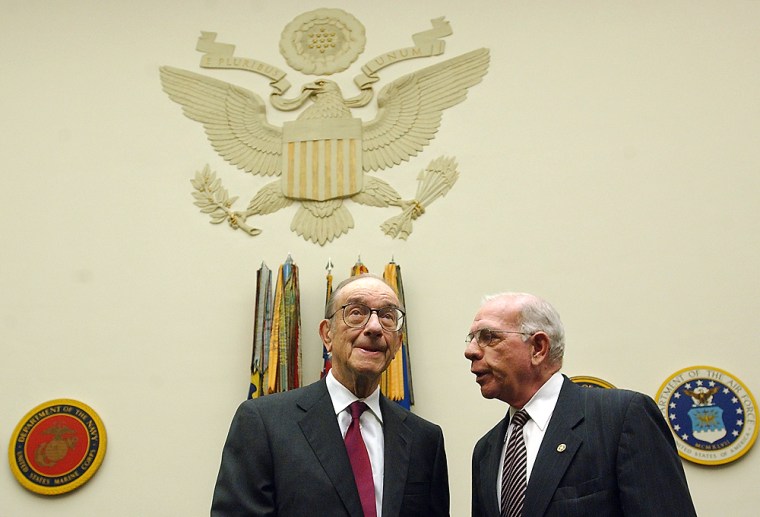Federal Reserve Chairman Alan Greenspan Thursday dismissed concerns the U.S. economy was entering a serious slowdown, signaling further increases in interest rates.
While the Fed chief warned about the possibility of a housing bubble in some local markets and noted the economy had followed a stop-and-start growth path in recent months, he said the economy appeared healthy and would likely remain so.
“Despite some of the risks that I have highlighted, the U.S. economy seems to be on a reasonably firm footing, and underlying inflation remains contained,” Greenspan said in testimony to the congressional Joint Economic Committee.
“Accordingly, the Federal Open Market Committee in its May meeting reaffirmed that it 'believes that policy accommodation can be removed at a pace that is likely to be measured,’” he added, quoting the Fed policy-setting panel.
While some analysts have worried a manufacturing slowdown and sometimes disappointing job growth may be warning signs of a broader weakening in the economy, Greenspan was more upbeat.
“The most recent data support the view that the soft readings on the economy observed in the early spring were not presaging a more-serious slowdown in the pace of activity,” he said.
Bond interest rates rose on the closely watched testimony, which economists said heralded a continuation in the Fed’s rate-rise campaign.
“They still think the economy is fairly strong, even if growth is a bit uneven,” said Steve Ricchiuto, chief U.S. economist at ABN AMRO in New York. “He’s telling you that they’re not going to stop tightening.”
The Fed has raised short-term borrowing costs eight times over the past year in a bid to head off inflation pressures, and is expected to raise official interest rates again June 30 after its next policy-setting meeting.
While Greenspan said a rise in hourly labor compensation late last year was caused by a surge in bonuses and thus likely transitory, he noted that slower growth in productivity — or hourly worker output — was pushing up U.S. labor costs.
He said it was not yet clear whether businesses would be able to pass on their higher costs to consumers, boosting inflation, or be forced to cut profits.
The Fed chairman repeated that while he did not think a nationwide housing price bubble was likely, there did appear to be signs of froth in some local markets where home prices have climbed to what seemed like unsustainable levels.
He said he was especially worried about the increase in riskier lending practices, which encouraged some households to buy homes they otherwise would not be able to afford.
“The dramatic increase in the prevalence of interest-only loans, as well as the introduction of other relatively exotic forms of adjustable-rate mortgages are developments of particular concern,” he said.
While analysts said Greenspan had come closer in his testimony to calling the housing market a bubble, he maintained a sanguine outlook on the impact of a drop in prices would have on the nation as a whole.
“Although we certainly cannot rule out home price declines, especially in some local markets, these declines, were they to occur, likely would not have substantial macroeconomic implications,” Greenspan said.
